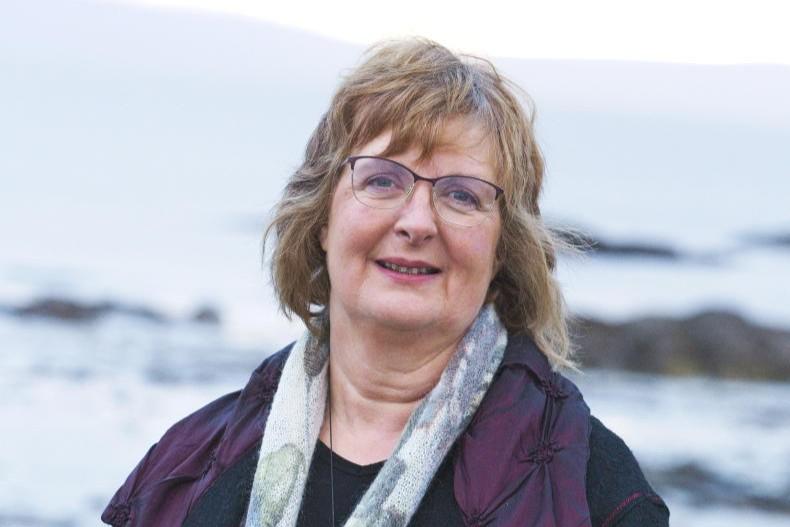Having grown up on a farm, occupational therapist Áine O’Dea sees many of the everyday tasks we take for granted as a form of “natural therapy” for children.
“So if it is that the kids can help with feeding the calves, brilliant,” she smiles. “It will develop your motor skills, your organisational skill.”
And this is especially true when working with children with Developmental Co-ordination Disorder (DCD) – more commonly known as dyspraxia – which is thought to affect 5-8% of children in the mainstream school setting; and is a condition that Áine is passionate about raising awareness of.
Originally from a dairy farm in Kilteely, Co Limerick, Áine studied occupational therapy in the UK and gained experience in senior clinical roles before returning to Ireland to work in early intervention services.
However, she is currently working on her Phd, looking at how children with DCD/dyspraxia can be supported to participate in everyday activities, with the backing of the Health Research Board at the University of Limerick.
Áine believes there is still “a lack of awareness” around DCD/dyspraxia, which she explains is a disorder that affects the acquisition and execution of gross motor skills (eg running, playing football, etc), fine motor skills (eg using a knife and fork, buttoning a shirt, etc), spatial awareness (eg knocking a glass of water, bumping into things, etc) and executive functioning skills (eg organising homework, lunchbox, etc).
However, she explains that the condition is often not flagged until children reach primary school, when some of the tell-tale signs appear.
“That their writing is way too big or way too small and spidery, or that they tire really easily and they don’t want to do it,” she gives as one example.
“Other things then are being able to pack their schoolbag, getting all the books out without everything being thrown out of the bag, being able to do the buttons on their shirt, etc.”
Áine explains that it is not just these skills that are the issue, however, but the knock-on effect; for instance, children losing their confidence when it comes to playing with their peers.
“We see secondary mental health difficulties, secondary social difficulties, secondary emotional difficulties,” explains Áine, “because maybe they’re not participating in enough activities early on, or they get isolated, or they drop out: so that’s where my real passion is.”
Áine stresses that with early intervention, many of these issues are treatable, and recommends that parents visit their GP if they believe that DCD/dyspraxia is a problem for their child. After that, they can ask for a referral to an occupational therapist or a physiotherapist, who will do a skills assessment and design a suitable therapy programme, which is often based on breaking down everyday activities into more manageable steps.
“We’ll look at what’s the problem, what’s the goal and then we’ll look at all the tasks in the middle and we’ll do a task analysis and say: ‘Okay, here’s the breakdown, here’s what we need to practice so that you can achieve that goal’,” she explains.
While expert intervention is vital, however, Áine is passionate about empowering parents to play an active role in their children’s therapy and frequently hosts workshops for groups on everything from how to master handwriting and organisational skills, to strategies for building confidence and independence.
She believes that everyday activities – from the home to the farm – are the building blocks for developing gross, fine and organisational skills for all children; not just those with DCD/dyspraxia.
“Get your child involved in activities from literally as young as possible – from the age of two – so that they’re helping to put their toys back into the toy basket. That’s organisation. That’s fine motor skills of having to pick them up, put them in the toy basket and clear them away,” she gives as an example.
“Even if there’s nothing wrong with their motor skills, it’s just really good for their confidence and what really grows resilient children is that sense of being able to do it independently and build on it as they grow up.”
Here, Áine shares some of her top tips for parents to support children with DCD/dyspraxia at home, but for further information, visit www.otforlife.ie CL
Áine’s top tips
• WORK TOGETHER: Identify the motor skills that your child needs or wants to master, eg using a fork or joining the football team. Pick no more than two goals to work on at a time. Practise the activity at home, observing what is working well and where there is a difficulty, almost like a “coach”. Ask the child how they feel it went and break it down together, eg for football, practise just kicking the ball at first, and so on. Children love to play with their parents and will thrive on practice and encouragement. • MAKE ORGANISATION CHILD’S PLAY: If a child is struggling with their organisational skills, eg getting ready for school in the morning, it’s possible to draw up a simple, step-by-step routine reminder using pictures and simple words, eg porridge, get dressed, brush teeth, school bag, hat and coat, bye bye, etc and hang it up at home. For an older child, work together to create a checklist of everything they need to bring to school/bring home and keep it in their homework copy. • CHORES BUILD SKILLS: Giving a child a small chore, eg bringing in the shopping, emptying the dishwasher, etc, will help develop problem-solving, organisation and motor skills, as well as confidence and self-esteem. • LEARN THROUGH FUN: There are many toys and games that are great for developing gross and fine motor skills, eg Twister, Operation, Lego, swing ball, etc. An added bonus is that they are great fun for all the family. • HELPFUL HOBBIES: Parents often ask for advice about leisure activities that will naturally build their child’s motor and organisational skills, eg karate. The best recommendation, however, is to find a hobby that is fun, as this will lead to more physical activity, social interaction and friendships forming, so the child will be more likely to stick with it.
Having grown up on a farm, occupational therapist Áine O’Dea sees many of the everyday tasks we take for granted as a form of “natural therapy” for children.
“So if it is that the kids can help with feeding the calves, brilliant,” she smiles. “It will develop your motor skills, your organisational skill.”
And this is especially true when working with children with Developmental Co-ordination Disorder (DCD) – more commonly known as dyspraxia – which is thought to affect 5-8% of children in the mainstream school setting; and is a condition that Áine is passionate about raising awareness of.
Originally from a dairy farm in Kilteely, Co Limerick, Áine studied occupational therapy in the UK and gained experience in senior clinical roles before returning to Ireland to work in early intervention services.
However, she is currently working on her Phd, looking at how children with DCD/dyspraxia can be supported to participate in everyday activities, with the backing of the Health Research Board at the University of Limerick.
Áine believes there is still “a lack of awareness” around DCD/dyspraxia, which she explains is a disorder that affects the acquisition and execution of gross motor skills (eg running, playing football, etc), fine motor skills (eg using a knife and fork, buttoning a shirt, etc), spatial awareness (eg knocking a glass of water, bumping into things, etc) and executive functioning skills (eg organising homework, lunchbox, etc).
However, she explains that the condition is often not flagged until children reach primary school, when some of the tell-tale signs appear.
“That their writing is way too big or way too small and spidery, or that they tire really easily and they don’t want to do it,” she gives as one example.
“Other things then are being able to pack their schoolbag, getting all the books out without everything being thrown out of the bag, being able to do the buttons on their shirt, etc.”
Áine explains that it is not just these skills that are the issue, however, but the knock-on effect; for instance, children losing their confidence when it comes to playing with their peers.
“We see secondary mental health difficulties, secondary social difficulties, secondary emotional difficulties,” explains Áine, “because maybe they’re not participating in enough activities early on, or they get isolated, or they drop out: so that’s where my real passion is.”
Áine stresses that with early intervention, many of these issues are treatable, and recommends that parents visit their GP if they believe that DCD/dyspraxia is a problem for their child. After that, they can ask for a referral to an occupational therapist or a physiotherapist, who will do a skills assessment and design a suitable therapy programme, which is often based on breaking down everyday activities into more manageable steps.
“We’ll look at what’s the problem, what’s the goal and then we’ll look at all the tasks in the middle and we’ll do a task analysis and say: ‘Okay, here’s the breakdown, here’s what we need to practice so that you can achieve that goal’,” she explains.
While expert intervention is vital, however, Áine is passionate about empowering parents to play an active role in their children’s therapy and frequently hosts workshops for groups on everything from how to master handwriting and organisational skills, to strategies for building confidence and independence.
She believes that everyday activities – from the home to the farm – are the building blocks for developing gross, fine and organisational skills for all children; not just those with DCD/dyspraxia.
“Get your child involved in activities from literally as young as possible – from the age of two – so that they’re helping to put their toys back into the toy basket. That’s organisation. That’s fine motor skills of having to pick them up, put them in the toy basket and clear them away,” she gives as an example.
“Even if there’s nothing wrong with their motor skills, it’s just really good for their confidence and what really grows resilient children is that sense of being able to do it independently and build on it as they grow up.”
Here, Áine shares some of her top tips for parents to support children with DCD/dyspraxia at home, but for further information, visit www.otforlife.ie CL
Áine’s top tips
• WORK TOGETHER: Identify the motor skills that your child needs or wants to master, eg using a fork or joining the football team. Pick no more than two goals to work on at a time. Practise the activity at home, observing what is working well and where there is a difficulty, almost like a “coach”. Ask the child how they feel it went and break it down together, eg for football, practise just kicking the ball at first, and so on. Children love to play with their parents and will thrive on practice and encouragement. • MAKE ORGANISATION CHILD’S PLAY: If a child is struggling with their organisational skills, eg getting ready for school in the morning, it’s possible to draw up a simple, step-by-step routine reminder using pictures and simple words, eg porridge, get dressed, brush teeth, school bag, hat and coat, bye bye, etc and hang it up at home. For an older child, work together to create a checklist of everything they need to bring to school/bring home and keep it in their homework copy. • CHORES BUILD SKILLS: Giving a child a small chore, eg bringing in the shopping, emptying the dishwasher, etc, will help develop problem-solving, organisation and motor skills, as well as confidence and self-esteem. • LEARN THROUGH FUN: There are many toys and games that are great for developing gross and fine motor skills, eg Twister, Operation, Lego, swing ball, etc. An added bonus is that they are great fun for all the family. • HELPFUL HOBBIES: Parents often ask for advice about leisure activities that will naturally build their child’s motor and organisational skills, eg karate. The best recommendation, however, is to find a hobby that is fun, as this will lead to more physical activity, social interaction and friendships forming, so the child will be more likely to stick with it. 









SHARING OPTIONS